2017 Toyota Mirai Repair, Service & Tires
Get Started
Complete Auto Care for Your 2017 Toyota Mirai
-
TIRES FOR YOUR 2017 Toyota Mirai View Tire Info GET TIRE PRICING
-
REPAIR FOR YOUR 2017 Toyota Mirai View Repair Info SCHEDULE REPAIR
-
MAINTENANCE FOR YOUR 2017 Toyota Mirai View Maintenance Info SCHEDULE MAINTENANCE
-
OFFERS FOR YOUR 2017 Toyota Mirai Limited Time Tire Offers VIEW ALL COUPONS
2017 Toyota Mirai Tires
Recommended Tires | Tire Information
2017 Toyota Mirai Tires Sizes, Speed Ratings, and Inflation
Not sure about your 2017 Toyota Mirai tire size? Use the following chart to find information on tire size, speed rating, and inflation.
| Trim Level | Speed Rating | Inflation in PSI F/R | Tire Size |
|---|---|---|---|
| 2017 Toyota Mirai Base | V | 36 PSI/36 PSI | P215/55R17 |
|
2017 Toyota Mirai Base Speed Rating: V Inflation F/R: 36 PSI/36 PSI |
* Note: these models have different tire sizes depending on vehicle options.
Recommended Tires for Your 2017 Toyota Mirai
What tires are best for a 2017 Toyota Mirai? Check out the following tire brands and types.
 Ecopia EP422 Plus
Ecopia EP422 Plus
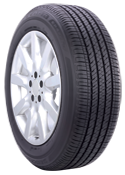
- Platinum Pact Limited Warranty
- All-Season
- Performance
 Blizzak WS90
Blizzak WS90
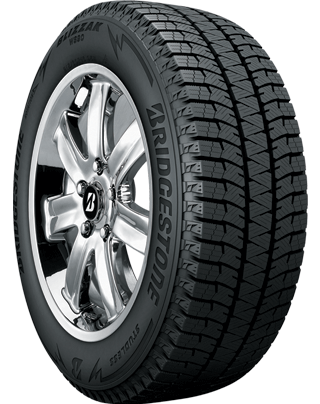
- No warranty
- Winter
- Winter
 Potenza Sport AS
Potenza Sport AS
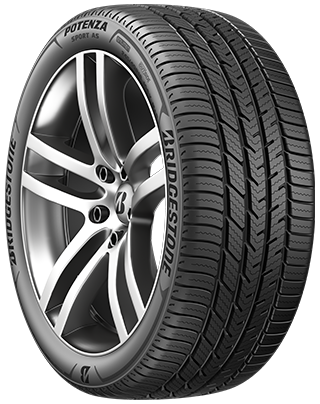
- Platinum Pact Limited Warranty
- All-Season
- Performance
 DriveGuard Plus
DriveGuard Plus
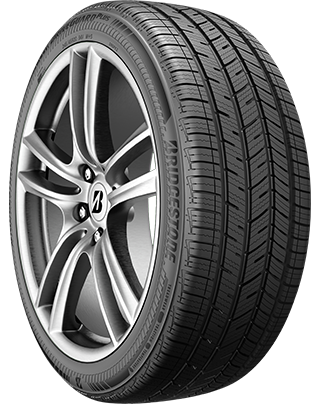
- Platinum Pact Limited Warranty
- All-Season
- Performance
 Turanza LS100
Turanza LS100
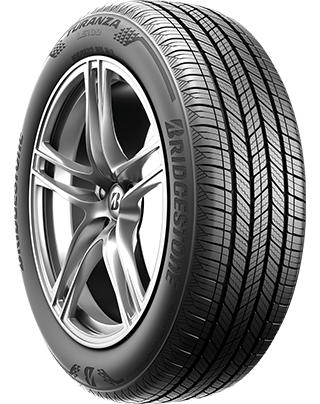
- Platinum Pact Limited Warranty
- All-Season
- Performance
 Turanza QUIETTRACK
Turanza QUIETTRACK
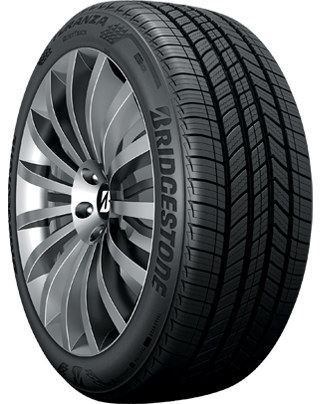
- No warranty
- All-Season
- Performance
 Turanza T005A
Turanza T005A
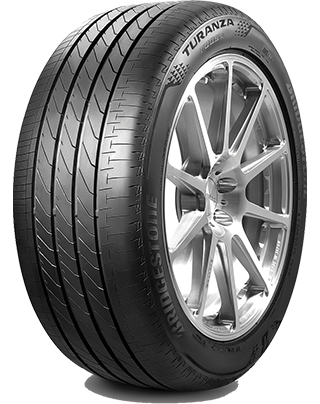
- No warranty
- Summer
- Performance
 WEATHERPEAK
WEATHERPEAK
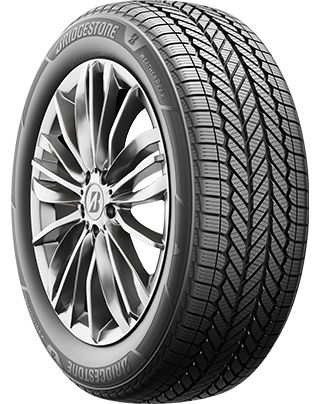
- Platinum Pact Limited Warranty
- All-Season
- Passenger Tires
 ALL SEASON
ALL SEASON

- No warranty
- All-Season
- Passenger Tires
 Firehawk AS V2
Firehawk AS V2
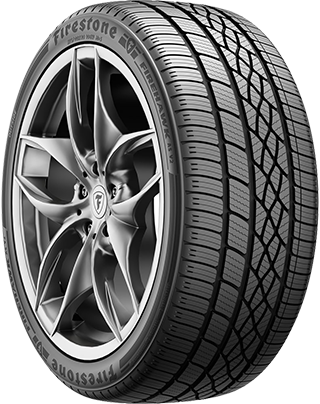
- No warranty
- All-Season
- Performance
 Firehawk Indy 500
Firehawk Indy 500
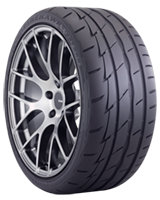
- Gold Pledge Limited Warranty
- Summer
- Performance
 WEATHERGRIP
WEATHERGRIP
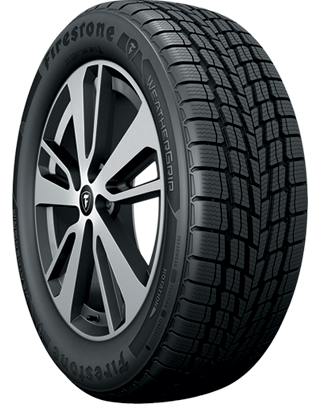
- No warranty
- All-Season
- Passenger Tires
 Winterforce 2
Winterforce 2
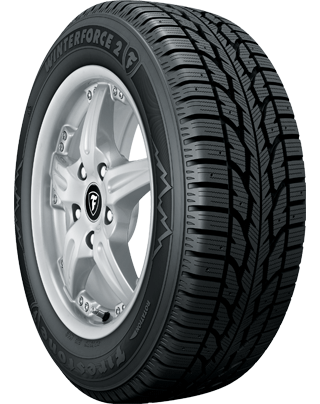
- No warranty
- Winter
- Winter

- No warranty
- All-Season
- Passenger Tires

- No warranty
- All-Season
- Passenger Tires
 Extensa A/S II
Extensa A/S II

- No warranty
- All-Season
- Passenger Tires
2017 Toyota Mirai Tire Information
Beyond the correct tire size, you also want to think about a couple of other things when getting new Toyota Mirai tires like which tire brands you like most and where you drive. When evaluating your driving conditions, think about where you live (countryside vs. city vs. mountains) and the kind of unexpected weather you're likely to experience. It's not uncommon for drivers in states that experience all four seasons to buy more than one set of tires. one for winter and one for summer. Other drivers prefer to purchase one all-season set to limit trips to the tire shop and make sure their vehicle is prepared in the rain, sleet, snow, or sun!
Next, consider your driving style. If you're an avid off-roader who yearns to pioneer new paths, you have very different tire needs than a highway commuter who doesn't hit the hills very often. Browse Toyota Mirai tires online or come to your nearby Firestone Complete Auto Care for help selecting the tire that's right for you.
Installing Toyota Mirai Tires
Firestone Complete Auto Care installs more tires on more cars than most other companies. We're your tire shop and a complete service center for tire installation, maintenance, repair, rotation, and alignment! Shop 2017 Toyota Mirai tires online and schedule an installation appointment.
2017 Toyota Mirai Tire Questions
-
Why does Toyota tire inflation matter? Even a tiny decrease in tire pressure could impact your safety and fuel economy. Maintaining proper tire pressure can help increase fuel economy, improve braking time, and boost tire lifespan.
-
Why are there numbers on the side of my Toyota Mirai tires? The numbers on your tire sidewall give you information about tire speed rating, traction, treadwear, tire size, and load carrying capacity. Chat with a tire technician to learn how to read the numbers on your Toyota tires!
-
Can I check the tread depth on my Toyota tires at home? Stay on top of your tire tread depth to help avoid a dangerous drive. You can check tread depth with a penny. Hold the penny so that Abraham Lincoln is facing you, then place your penny into a tread groove upside down. If you can see the top of Abe’s head, your tread is shallow and it might be time for new Toyota Mirai tires. Grab a penny. Hold the so that Abe Lincon's head is facing you and his hair is pointing toward the ground. Then, place the penny into a tread groove. If you can see the top of Abe’s head, your tread is shallow and it might be time for new Toyota Mirai tires.
Types of 2017 Toyota Mirai Repairs
When to repair, when to replace? Click on a repair below to learn more about Toyota Mirai repairs at Firestone Complete Auto Care.
Get Repairs for Your 2017 Toyota Mirai
Car repairs: for many drivers, that phrase is a dreadful one. We’re here to change that, though. At Firestone Complete Auto Care, we want to make car repair painless and hassle-free. Bring your 2017 Toyota Mirai in for repair services and our skilled repair technicians will get your Mirai back on the road. Before we begin any repair work, we’ll diagnose any issues and answer your questions about potential repair options. We’ll never recommend a repair we don’t think is necessary for your safety or the performance of your Toyota.
How Much Does Toyota Mirai Repair Cost?
Several factors can affect the cost to repair your 2017 Toyota Mirai, including what kind of repair you need, the cost of any replacement parts, how much labor the repair will take, and your locale. And check back often — we update our deals regularly!
A few different aspects can influence repair costs for your 2017 Toyota Mirai, like
2017 Toyota Mirai Auto Repair Q&A
-
Do I need to follow Toyota's maintenance schedule? The cheapest 2017 Toyota Mirai repair is the one that isn’t necessary in the first place! Staying up-to-date with your car’s scheduled maintenance services is a great way to keep future repair costs low.
-
Should I bring my Toyota in even if I can't pinpoint the problem? You’re in your car, day in and day out. So, it’s only expected that you know your car better than anyone else! If you notice mysterious smells, strange engine noises, or other out-of-the-ordinary symptoms while driving, trust your instincts and stop into Firestone Complete Auto Care for a Courtesy Check. Catching a potential issue early could help prevent Toyota Mirai repairs.
-
Why do you recommend certain repairs for my Toyota? We won’t recommend a service or repair for your 2017 Toyota Mirai unless we think it’s necessary to keep you safe. Want to know more about a specific recommended repair? Ask! We’re here to help.
2017 Toyota Mirai Brake Repair
You might have a strong and reliable engine in your Toyota Mirai. But if you can’t stop it, it’s as good as scrap metal. If you’re experiencing squeaky brakes or a loss of braking power, don’t wait! Unresponsive brakes make it tough to give the road your best. What's more, waiting for things to figure themselves out can result in more damage to your brakes and your wallet. Get your 2017 Toyota Mirai brakes fixed at Firestone Complete Auto Care. We offer many affordable brake repairs like pad/shoe replacement, brake rotor/drum refinishing, brake fluid exchange/bleeding, and brake caliper and wheel cylinder service.
Questions About Your Toyota Mirai Brakes
-
What can cause my Mirai to shake when I apply the brakes? Faulty brake calipers, worn brake pads or rotors, loose or worn suspension parts, and warped rotors can cause your Mirai to shake during braking. If you’re experiencing odd brake behavior, schedule a free brake inspection at a nearby Firestone Complete Auto Care.
-
What is the average lifespan of Mirai brake pads? Brake pads typically last about 30,000 to 40,000 miles. However, driving conditions can affect this range. Sticking to highway driving and braking smoothly can help extend the life of your brake pads, while towing heavy loads or frequently riding your brakes can shorten it.
-
Is it bad if my Mirai is leaking brake fluid when off? Your Mirai brake system is a closed hydraulic system, so a brake fluid leak likely means you have an issue in your brake system. Over time, brake components can wear out or get damaged, causing a brake fluid leak.
When to Get Toyota Mirai Drivetrain Repairs
Drivetrains for front, rear, and all-wheel-drive and 4WD vehicles are not all the same. You don't want to go to any random shop for drivetrain repair. You want to go to Firestone Complete Auto Care. We can take care of most 2017 Toyota Mirai drivetrain components Your Mirai might need driveshaft repair if you notice vibration as your vehicle accelerates, clunks when shifting, heavy vibrations in your floorboards, or resistance when turning.
2017 Toyota Mirai Drivetrain Q&A
-
What are signs my Toyota drivetrain is damaged? Noises toward the back of your Toyota Mirai, leaking fluid, trouble turning — these could all be signs of drivetrain damage you want to address. Take action before something more severe happens.
-
Why is my Mirai malfunction indicator light (MIL) on? Engine problems, transmission problems, faulty sensors, electrical issues, misfire issues, and connector problems could all cause your Mirai’s malfunction warning light, or better known as the check engine light, to illuminate.
-
How concerning is a drivetrain malfunction in my Mirai? Don't ignore a drivetrain malfunction in your Mirai. As soon as you notice a problem, have it checked by a professional mechanic to diagnose the issue and carry out any necessary repairs. Driving with a faulty drivetrain is risky and may further damage your Mirai.
2017 Toyota Mirai Wheel Alignment
An alignment involves making adjustments to your Toyota Mirai's suspension system, which serves to attach your wheels to your vehicle. When your car has an alignment service, your tire angles are adjusted according to measurements recommended by Toyota. Why? So that your tires can make contact with the road at the best possible angle. Bring your 2017 Toyota Mirai in for a wheel alignment and we'll start with an alignment check. After that, we can adjust your wheel alignment angles until they match Toyota’s recommended measurements.
Answers to Toyota Mirai Alignment Questions
-
What can knock my Toyota Mirai out of alignment? Potholes and uneven roads can knock your car out of alignment, so stay aware of the road ahead and adjust your speed (or avoid these obstacles whenever it’s safely possible).
-
When should you get a wheel alignment for your Mirai? Check your Mirai owner's manual for Toyota's recommended interval. It's generally a good idea to check your alignment every 6,000 miles or 6 months, depending on which comes first.
-
Do you need to get your Mirai wheels aligned when you get new tires? While you don’t necessarily need to get an alignment when putting new tires on your Mirai, it’s still a good idea. Ensuring your wheels are properly aligned can help support optimal handling, tire wear, and fuel efficiency.
2017 Toyota Mirai Engine Repair
When your Toyota Mirai engine needs repairs, our technicians will make sure you understand what’s going on before they start working on your engine. We make recommendations, but you make the final decision. If a service can wait, we’ll make sure you know. If it's necessary for your safety, we'll make sure you understand that, too. We want to provide you with the information you need to make an informed engine repair decision. By choosing Firestone Complete Auto Care for Mirai engine repairs and you can feel confident knowing that we use Toyota-approved parts and components like the serpentine belt, valve guide seal, fuses, or another part.
2017 Toyota Mirai Engine Q&A
-
Why does the check engine light come on when I start my Mirai? It's okay if your check engine light comes on when you first start your vehicle. This is a sign that your vehicle is testing its circuits. The light should go off shortly. Bring your vehicle in if it doesn't.
-
Why is my Toyota Mirai making engine noise? Strange under-the-hood noises can point to problems within your Toyota Mirai engine. Tapping or knocking could mean you need an oil change. Whistling sounds could mean you have an intake leak or misaligned belt. Squealing may be caused by a loose fan belt, and grinding could be a sign that something is wrong with your brakes — not the engine.
-
What could damage my Toyota Mirai engine? Certain driving habits can damage your engine and should be avoided. These habits include 'running on fumes,' revving the engine while still in Park, or pushing 'the pedal to the metal' before the engine has warmed up. Help sustain your engine’s performance and efficiency by staying miles away from these bad driving practices.
Get Your Toyota Mirai Tire Repaired
Firestone Complete Auto Care is here for you when your 2017 Toyota Mirai needs flat tire repair or inspection. There’s a chance your tire could be plugged and patched (rather than replaced). Our technicians can inspect your tire and let you know if it is safe to repair. To start, we’ll consider the location of tire damage, the type of issue, the size and scope of the damage, and the amount of wear on your tires.
If a repair on your 2017 Toyota Mirai tire is feasible and safe, we'll follow three basic steps to repair it: (1) Take the tire off the wheel for easy inspection, (2) fill in the area that’s been punctured to prevent damage from moisture, and (3) secure and seal the inner tire liner to ensure the tire is airtight.
Your Questions About Toyota Mirai Tire Repair, Answered
-
Can I drive my Toyota on a flat tire? A flat tire that’s not addressed can take a terrible toll on the rest of your car. Until you have it repaired or replaced, drive your Mirai as little as possible to reduce your risk of damage to the wheels and alignment – or further damage to that already struggling tire!
-
Can I use an emergency/temporary sealant to fix my Toyota's flat tire? A temporary sealant may be able to help you get to a repair location safely. But temporary or emergency sealants could possibly damage TPMS sensors, and in some cases may even void the warranty on your Bridgestone or Firestone tires. If your tire needs extensive repair, sealant can add time and labor costs to the process.
-
What is causing the tires on my Mirai to keep losing air? Possible reasons for your Mirai tires continuously losing air include a leaking valve steam, wheel damage, and a puncture or hole in the rubber.
2017 Toyota Mirai Maintenance
When it comes to your Toyota Mirai, how you treat your car makes all the difference in its performance. With proactive maintenance, your Mirai could be on the road well past the 200,000 mile mark.
2017 Toyota Mirai Maintenance Schedule
What is the manufacturer recommended maintenance schedule for a 2017 Toyota Mirai? Find maintenance info for your vehicle.
About 2017 Toyota Mirai Scheduled Maintenance
It can be overwhelming, but fortunately, there’s a resource that takes the guesswork out of routine Mirai maintenance. Rely on the recommended maintenance schedule that’s been created just for your 2017 Toyota Mirai! The recommended maintenance schedule is put together by Toyota, your vehicle manufacturer. Driving conditions, climate variations, and other variables can affect which scheduled maintenance services you’ll need; however, there’s a good chance that your vehicle’s recommended maintenance services will include tire rotations, vital fluid checks/exchanges, filter changes, brake pad replacement, and oil changes. Scheduling routine service appointments is one of the best ways to help extend your Mirai's life, decrease your risk of dangerous malfunctions on the road, and prevent common 2017 Toyota Mirai problems.
Essential Maintenance to Keep Your 2017 Toyota Mirai Running Newer, Longer
Head to your nearest Firestone Complete Auto Care in your 2017 Toyota Mirai for factory-recommended routine maintenance and our technicians will jump right in with a Courtesy Check. This Courtesy Check can establish a baseline of what may need to be addressed during your service appointment. Each Courtesy Check includes a free battery test and an inspection of your Mirai's windshield wiper blades, head and tail lights, filters, fluid levels, tires, and alignment.
Firestone Complete Auto Care is the place to go for 2017 Toyota Mirai maintenance. So visit us regularly, or visit us urgently. Many locations are open on weekends and in the evening.
2017 Toyota Mirai Maintenance Q&A
-
What should I do after hitting a pothole in my Toyota Mirai? You know your Toyota Mirai better than anyone else, so you’ll know if something doesn’t feel right while driving. Have your alignment checked (and adjusted if necessary) as soon as you notice a pulling steering wheel to prevent suspension damage or uneven tire wear.
-
When does my Toyota Mirai need high mileage oil? Do you have more than 75,000 miles on your Toyota Mirai? If so, request to switch to high mileage oil at your next oil change. This type of oil is specially formulated to keep aging engine parts in the best possible condition.
-
Why are my Toyota dashboard lights on? Don't ignore dashboard warning lights! Bring your Toyota Mirai in for a diagnostic code scan as soon as a dashboard warning light flashes on, whether it's your check engine or battery light. Dashboard lights alert you to trouble under the hood.
2017 Toyota Mirai Batteries
The average car battery lasts three to five years. Don’t get stranded by your Mirai’s car battery. Replace it regularly instead! Watch for signs that your current battery is getting too old or too weak. A slow engine crank, a blinking battery or check engine light, bloated battery case, corroded battery posts, or dim headlights can all be signs that your battery needs attention.
Or, you can get a complimentary battery check at your nearest Firestone Complete Auto Care. Stop by for a free battery test and, if needed, get your Toyota Mirai a replacement battery. Car batteries are only one of our many strong suits. Our technicians are familiar with Toyota-specific recommendations for Mirai battery cold cranking amps and reserve capacity. Get help identifying the type and size of battery that matches your vehicle, and schedule a fast car battery replacement at your earliest convenience.
Answers to Your Toyota Mirai Car Battery Questions
-
Why won’t my Toyota Mirai battery hold a charge? A battery that won't hold a charge is almost as good as dead. The battery might be old. Or, you may have a habit of leaving your car doors open and the lights on overnight. Stop by for a free battery test at your local Firestone Complete Auto Care to learn more about the state of your battery.
-
How long do car batteries last? Car battery lifespan varies depending on a few factors, including driving conditions, accessories, how well it’s maintained, and the type of battery. On average, a car battery lasts about three to five years.
-
Why is there white, crusty buildup on my Mirai’s battery post? The white, flaky stuff that can build up around your Mirai’s battery terminals is known as corrosion. Acid leaking from your vehicle’s battery post can have a chemical reaction with the air, leading to an accumulation of the white, powdery substance over time. Corrosion can affect the flow of electricity between your battery and the electrical system in your Mirai, possibly causing issues with electrical performance and starting. If left unaddressed for long enough, it may even cause your battery to prematurely fail.
Oil Changes for 2017 Toyota Mirai
Toyota recommends changing your 2017 Mirai’s oil at regular intervals. Outside of Toyota-recommended oil change intervals, your Mirai may need an oil change if your check engine light is on, you hear knock knock knock coming from the engine, smell oil inside the car, or notice excess vehicle exhaust. You may also need an oil change more frequently than Toyota recommends if you haul heavy loads, drive in dusty areas, enjoy off-roading, or go at low speeds on long distance trips.
Whether you need high mileage oil, synthetic oil, or conventional oil, you'll find the right 2017 Toyota Mirai motor oil at Firestone Complete Auto Care. Consult Toyota's recommendations to select the right 2017 Mirai oil and talk with a teammate to learn more about our oil options: Quaker State® Advanced Durability™ conventional oil, Pennzoil® High Mileage Vehicle® motor oil, Pennzoil Platinum® Full Synthetic motor oil with PurePlus™ Technology, and Shell Rotella® heavy-duty engine oil. During an oil change, one of our techs will change your Mirai’s oil, replace and recycle your used oil and oil filter, inspect the rest of your car’s filters, refill vital car fluids, and visually inspect the rest of the vehicle. Let the experts take care of your Mirai’s engine by making an oil change appointment today.
2017 Toyota Mirai Oil Change Q&A
-
What does it mean if my Toyota Mirai oil light comes on? If you’re overdue for an oil change, it might trigger your Toyota Mirai oil change reminder light. If the oil pressure light is illuminated, it could be due to low engine oil, a failing oil pump, a malfunctioning oil pressure sensor, or a clogged oil filter.
-
Can I change my Toyota oil on my own? Changing engine oil at home isn’t as simple as it’s made out to be. You’ll have to figure out how to properly dispose of the oil and buy special tools. Having your oil changed professionally can not only reduce the risk of something going wrong during the service, but it’ll also help your car perform smoothly down the road.
-
Why is my Toyota exhaust smoke gray or blue? You could have an oil leak and have a case of burning oil. Looks like it’s time for a professional to take a look. The leak could be the result of worn valve seals, fried piston rings, or old cylinder walls.
2017 Toyota Mirai Tune-Up & Engine Service
Routine engine tune-ups can bring power back to your Mirai. Your local Firestone Complete Auto Care offers a range of engine tune-up services for your 2017 Toyota Mirai. The first is the standard Firestone Tune-Up. It includes a complete visual inspection of engine components, installation of new spark plugs, and a lifetime warranty on parts*. Another service option pays special attention to the filters in your Mirai. Specifically, we replace the fuel filter and air filter. Yet another service is a fuel system cleaning process, which involves removing varnish, dirt, and carbon deposits that have built up inside the fuel injectors, throttle body, and throttle plate in your Mirai. This can improve your fuel system’s performance (and therefore, your engine’s performance). Here’s something to remember when choosing services: the mileage and service history of your Mirai can determine what kind of service it needs. Chat with a Firestone technician before you jump into a specific service to ensure your engine tune-up money is well-spent.
*Ask a Firestone Complete Auto Care teammate about full terms and conditions for warranties.
Questions About 2017 Toyota Mirai Engine Tune-Ups
-
When should Toyota Mirai spark plugs be replaced? Replace spark plugs on time or about every 30,000 miles or so. Spark plugs are small but mighty. The spark of electricity that the plug emits across a small gap creates the ignition for the combustion needed to start your car. Without that spark, your car won't start.
-
What should I do if I see leaks under my Mirai? Puddles could indicate an oil leak, coolant leak, or brake fluid leak– all of which can critically hurt your engine. Have your engine inspected as soon as you spot a pool of liquid in your usual parking spot.
-
How often should I clean my Toyota Mirai fuel injectors? The cleaning schedule for vehicle fuel injectors varies depending on your driving conditions and the type of fuel you use. Some manufacturers suggest cleaning your fuel system as part of routine maintenance, while others will recommend it on an as-needed basis if you’re experiencing poor performance. Reference your Toyota owner’s manual for exact guidelines.
2017 Mirai Toyota Steering & Suspension Services
When you first drove your 2017 Toyota Mirai, the ride was probably so smooth that you didn’t even think about it! Lately, though, your ride’s been feeling a little bumpy. Perhaps your Mirai feels bouncy, leans to one side, or makes an unusual noise when going over a speed bump. As soon as you notice that something’s “off” with your 2017 Toyota Mirai, bring it in for steering and suspension services. We’ll get to the source of your car problems and, if your car needs steering and suspension repairs, we'll explain all of your options and the potential cost.
2017 Mirai Steering & Suspension Q&A
-
Why is my Toyota Mirai bouncing excessively? Excessive bouncing in your Toyota Mirai might be due to damaged struts or shocks that are unable to absorb road bumps effectively, causing your vehicle to feel more like a pogo stick than a smooth ride.
-
Why does my Mirai front end dip forward when I brake? As you brake, the forward momentum of your Mirai combined with its weight sends a ton of force to its front end. A damaged or worn suspension system can cause the front end to compress and dip even further.
-
What role do tire pressure and tread depth play in my Toyota's suspension? Maintaining your tires can help reduce strain on the suspension, nd also let you know when it's time to replace your tires. A faltering steering and suspension system could lead to uneven tire wear.
2017 Toyota Mirai A/C Service Near You
Our technicians will work to solve your 2017 Toyota Mirai A/C problems to the best of their ability. During this initial A/C performance check, we’ll look at the state of your 2017 Toyota Mirai’s A/C system to determine whether repair work is needed. This check includes a visual inspection, performance test, and pressure and leak test.
Let's say we repair your 2017 Toyota Mirai A/C system. We will also perform an A/C evacuation and recharge. To do this, one of our technicians will remove the refrigerant in your A/C system (if there is even any left to remove). Next, they will evacuate the system according to Toyota's recommendations. To finish, we’ll add new refrigerant to recharge the A/C system.
Questions About 2017 Toyota Mirai A/C Systems
-
Why do I get hot air from my Mirai A/C? Maybe your A/C starts cool but then gets warm. Or maybe it never gets cold in the first place. Either way, your A/C troubles could be traced back to a clogged expansion valve, faulty compressor clutch, blown fuse, or leak.
-
What can cause an A/C system leak? To put it simply, age and moisture are some of the main causes of leaks in your A/C. Over time, rubber gaskets and seals can wear out, which pushes much-needed refrigerant out of your Mirai’s A/C system — and lets outside moisture get in, which can take a toll on internal A/C components.
-
Why does my vehicle have to be moving for my Mirai’s A/C to work? A problem with one or more of your air conditioning or electrical system components could cause the A/C to only work when your Mirai is moving. You may be low on refrigerant, or the cooling fan could be faulty.
Transmission Services for 2017 Toyota Mirai
The transmission delivers power from the engine to the wheels so that you can drive on your terms. Because of the transmission’s responsibility to translate the right dose of power into the right amount of speed, a tiny transmission issue can take a major toll on your car’s performance. Toyota Mirai transmission problems can present themselves as shifting delays, grinding when accelerating, the car shaking on the road, or a burning smell or whistling sounds coming from under the hood. Let Toyota Mirai transmission problems linger and you could see your fuel economy decrease or find that you can't drive your Mirai at all. Our expert techs are familiar with 2017 Mirai services and perform them according to Toyota-recommended specifications. As soon as you suspect something’s wrong with your Mirai’s transmission, book an appointment at your local Firestone Complete Auto Care to help diagnose, treat, and prevent major transmission issues.
Questions About 2017 Toyota Mirai’s Transmission
-
Does my Mirai's transmission fluid need to be inspected? Maintaining your Toyota Mirai transmission fluid is one of the best ways to maintain your transmission's health. A general rule of thumb is to have your transmission fluid checked and changed about every 30,000 to 60,000 miles, but that timeline can change if you're hard on your Toyota. Leaks or low transmission fluid are easy to spot and affordable to repair.
-
Can my Toyota Mirai leak transmission fluid? Yes. Toyota Mirai transmission fluid can leak over time and potentially cause transmission issues. Worn or damaged seals, a loose or damaged transmission pan, a cracked transmission housing, faulty transmission cooler lines, or an overfilled transmission could cause transmission fluid leaks.
-
Can I still drive my Toyota Mirai if it has a transmission fluid leak? You should avoid driving with a transmission fluid leak. Your transmission system relies on transmission fluid to operate properly, and a leak may decrease performance, cause your Mirai to overheat, or even lead to transmission failure.
Vehicle Inspection for 2017 Toyota Mirai
Every service performed at Firestone Complete Auto Care includes a multi-point Courtesy Check. To start, one of our technicians will check the battery in your Toyota Mirai to find out how much charge is remaining on it. We’ll follow the battery inspection with a visual check of your Toyota Mirai’s filters, lights, wiper blades, fluid levels, belts, hoses, tires, and alignment.
While every visit to your local Firestone Complete Auto Care includes a Courtesy Check, we can also dig deeper and perform a Complete Vehicle Inspection on your 2017 Toyota Mirai if you prefer. During a Complete Vehicle Inspection, we’ll visually check everything that’s on the list for a Courtesy Check. Additionally, we’ll perform a hands-on examination of your steering and suspension system, brakes, and exhaust components. With this inspection, we want to help you stay on top of any issues that may wreak havoc on your 2017 Toyota Mirai if left unaddressed.
Depending on your location, you may be able to take care of your state inspection or safety test at your local Firestone Complete Auto Care. Specific requirements for these types of inspections vary by state.
FAQs for 2017 Toyota Mirai Vehicle Inspections
-
How do I know if my Toyota Mirai needs a check-up? You drive your car, day in and day out, so you know it best. If you notice unusual engine noises or you can’t shake the feeling that something is 'off,' start with a Courtesy Check to stay ahead of potential issues.
-
Can you fix my 2017 Toyota Mirai so it will pass a state inspection test? There's a good chance we can. Stop by for a full system inspection and we'll get to the root of the issue.
-
When should I get a complete vehicle inspection for my Toyota Mirai? It’s generally a good idea to get a complete vehicle inspection for your Toyota Mirai before a road trip and/or when something strange occurs and you are unable to find the cause. Signs something is up include dashboard lights illuminating, odd noises coming from the engine, and your steering feeling loose or tight.
Radiator Service & Repair for 2017 Toyota Mirai
Keeping up with regular radiator maintenance in your 2017 Toyota Mirai is a huge factor in the longevity of your engine. In fact, Toyota recommends replacing coolant/antifreeze at specific intervals, but it’s also wise to keep an eye out for signs of a failing radiator. You could be on the verge of a radiator-induced engine breakdown if you notice a low coolant light or higher-than-normal engine temperatures on your dashboard, or if you spot coolant leaks coming from your car.
When you come to Firestone Complete Auto Care, we’ll begin your radiator repair with an in-depth inspection of the cooling system in your Toyota Mirai. We then do a machine-powered radiator exchange, replenish flushed chemicals, sealants, and lubricants, and then pressure check for leaks. From the heater core to the radiator cap, your 2017 Toyota Mirai is in good hands at Firestone Complete Auto Care.
2017 Toyota Mirai Radiator Q&A
-
What does the coolant light on my Toyota dashboard mean? Pay attention to the temperature gauge and lights on your dashboard. If a low coolant warning light comes on or your dashboard temperature gauge keeps rising, it’s likely that your engine is about to overheat (and could leave you stranded on the road). Wait for the engine to cool down, then have your coolant system checked immediately at your nearest Firestone Complete Auto Care.
-
My Mirai overheated! What can cause that? Your Toyota Mirai engine could overheat due to low coolant, a clogged radiator, a damaged water pump, a malfunctioning cooling fan, or a faulty thermostat.
-
My Mirai radiator sounds like it's rumbling or boiling! What's up? Your Mirai’s cooling system could contain air pockets or your radiator might be clogged. Another possibility is a faulty radiator cap, which is an easy fix!